|
|
|
Sort Order |
|
|
|
Items / Page
|
|
|
|
|
|
|
| Srl | Item |
| 1 |
ID:
113881
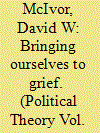

|
|
|
|
|
| Publication |
2012.
|
| Summary/Abstract |
Within political theory there has been a recent surge of interest in the themes of loss, grief, and mourning. In this paper I address questions about the politics of mourning through a critical engagement of the work of Judith Butler. I argue that Butler's work remains tethered to an account of melancholic subjectivity derived from her early reading of Freud. These investments in melancholia compromise Butler's recent ethico-political interventions by obscuring the ambivalence of political engagements and the possibilities of achieving and sustaining non-dogmatic identities. To overcome this impasse I argue for an alternative framing of mourning by turning to the psychoanalytic theory of Melanie Klein. An account of mourning that leans upon Klein's work cashes in on the ethical and political promises that are immanent yet unrealized in Butler's recent work while providing a new orientation for mourning in, and for, democratic politics.
|
|
|
|
|
|
|
|
|
|
|
|
|
|
|
|
| 2 |
ID:
156651
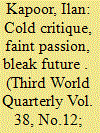

|
|
|
|
|
| Summary/Abstract |
This article carries out a psychoanalytic critique of Post-Development, arguing that the latter’s inattention to the unconscious underpinnings of power not only leaves it unable to explain why development discourse persists, but also deprives it of a radical politics, resulting in a surrender to global capitalism. Drawing on the work of Escobar, Ferguson and Esteva, the article valorises Post-Development’s important insights on the production of development discourse and its attendant power mechanisms. But using a Lacanian lens, it also probes Post-Development’s failure to address how power is mediated at the level of the subject: in maintaining that (capitalist) development is produced discursively in a cold, impersonal way (like an ‘anti-politics machine’), Post-Development ignores the fact that such power is only able to take hold, expand and, crucially, persist through unconscious libidinal attachments (e.g. desires, enjoyment). This failure leaves Post-Development with few resources – beyond localised resistance (Escobar, Esteva) or the call for a universal basic income (Ferguson) – to address the structural challenges of global capitalism. Psychoanalytically speaking, such a (Left) position appears to manifest a secret desire that nothing too much must change: Post-Development may well criticise the disciplinary mechanisms of neoliberal development, but ultimately it engages in an unconscious acceptance of capitalism.
|
|
|
|
|
|
|
|
|
|
|
|
|
|
|
|
| 3 |
ID:
030178


|
|
|
|
|
| Publication |
New York, Schocken books, 1983.
|
| Description |
vi, 282p.
|
| Standard Number |
0805238174
|
|
|
|
|
|
|
|
|
|
|
|
Copies: C:1/I:0,R:0,Q:0
Circulation
| Accession# | Call# | Current Location | Status | Policy | Location |
| 027315 | 303.484/HAY 027315 | Main | On Shelf | General | |
|
|
|
|
| 4 |
ID:
142850


|
|
|
|
|
| Summary/Abstract |
For the past three decades, nationalism has been a topic of great interest among scholars in the field of Thai Studies. Most of these scholars have, however, neglected the issue of gender in their examination of Thai nationalism. This article addresses this oversight by examining Thawiphop (Two Worlds) and Khu kam (Sunset on the Chao Phraya), two of the most popular novels by Thommayanti. As a well known nationalist and self-proclaimed feminist, Thommayanti has united the topics of gender and nationalism in these two works by representing female protagonists who strive to play an active role in the nationalist effort. Close examination reveals, however, that the nationalism of both protagonists is based on the psychoanalytic structure of the family romance that ultimately leads to a subversion of their agency. Thus, despite Thommayanti's attempt to depict strong and independent women in her novels, her characters ultimately fall short of transcending their subordinate roles in the discourse of nationalism.
|
|
|
|
|
|
|
|
|
|
|
|
|
|
|
|
| 5 |
ID:
162494
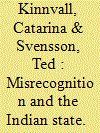

|
|
|
|
|
| Summary/Abstract |
A focus on misrecognition allows us to move between levels of analysis in a holistic fashion. If misrecognition works through the conscious and the unconscious we can account for the many overlapping insecurities and securities believed to exist at the individual, group, or state level – and thus felt. These insecurities also present themselves through the categories used to describe them and the policies through which they become materialised, technologised, and depoliticised, often by closing down discursive boundaries. Lacan’s concepts of desire, real and lack are here important for understanding the impossibility of recognising something that cannot be recognised. Hence, a perspective that takes misrecognition not as an end result or as failed attempts to reformulate the exceptional as the normal, has the potential to rethink the political subject. In empirical terms, the article discusses how this process of misrecognition has been shaped in the Indian context of postcolonial state formation and articulations of sovereignty. We show how the Indian state is being rethought, restructured, and reimagined through Hindu nationalism and how the concept of misrecognition accounts for desires for sovereign agency and group cohesiveness, but also for resistance to various reimaginations of the Indian state.
|
|
|
|
|
|
|
|
|
|
|
|
|
|
|
|
| 6 |
ID:
131844
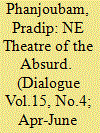

|
|
|
|
|
| Publication |
2014.
|
| Summary/Abstract |
Writing of Manipur and the Northeast, especially by those of us who belong here and, therefore, fit in the category of what psychoanalysts have come to refer to as the subject in analysts position, has never been easy. We run in to many self inhibiting hurdles, and among these is the forbidding shame of telling life experiences which we are aware others will find difficult to not only understand or empathize, but believe.
|
|
|
|
|
|
|
|
|
|
|
|
|
|
|
|
| 7 |
ID:
128300
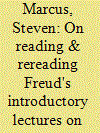

|
|
|
|
|
| Publication |
2014.
|
| Summary/Abstract |
I am going at least at first to write autobiographically. My justification for doing so is that I regard my experience as relatively typical and hence as bearing some fraction of non-negligible, if perhaps oblique, interest. I first read Freud sixty-?ve years ago. I was eighteen years old, and the occasion arose in what was then offered in my intellectually conservative college as a new course. The subject was in the humanities. and it consisted of works selected from some of the many masters of mid- nineteenth- and early-twentieth-century literature and thought. Included among them were such ?gures as Melville, Flaubert. Dostoevsky, Nietzsche. Henry and William James, George Bernard Shaw, I). H. Lawrence. Joyce, Proust, and Kafka. Inserted some- where in the second half of the chronological list was Freud's Introductory Lectures on Psychoanalysis, which he originally delivered between 1915 and 1917.' Hence the context in which Freud was pre- sented, and presented himself, to my largely bewildered late-adolescent sensibility was that of Western cultural, intellectual, and literary modernism. It was an advantage, I believe, to have read him for the first time among other immensely distinguished minds, writers who were in the course of radically departing from what had been generally accepted as canonical forms, conceptions, and conventions of representation - and of norms and values. including the values of civilization and of life itself.
|
|
|
|
|
|
|
|
|
|
|
|
|
|
|
|
| 8 |
ID:
092125
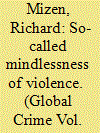

|
|
|
|
|
| Publication |
2009.
|
| Summary/Abstract |
This article proposes that violence may be most usefully thought about as a psychological rather than a behavioural phenomenon. Violence, it is contended, is a pathological variant of aggression, where 'aggression' is used to describe a particular part of the range of affective endowments possessed by human beings. We might think about aggression as a 'set' of which violence is a subset. As an affective endowment, aggression requires integration during development and this is supplied initially by an infant's primary carers and later by other important objects and institutions in the environment and culture in which the growing child lives. In the absence of the required conditions for enabling psychological integration to take place, rather than integration, disintegration holds sway with the aggressive affects denied or dissociated from. In this instance the affects do not become part of the affective repertoire upon which the individual can draw in order to orientate him or herself to their environment and in particular objects in the environment. Instead the affect is experienced as exterior and other and in some circumstances as violating. In this circumstances violence is resorted to as a way of escaping from the experience of overwhelming affects, for example by evoking in another affective experiences that cannot be tolerated within the self. Clinical case material is used to illustrate this.
|
|
|
|
|
|
|
|
|
|
|
|
|
|
|
|
| 9 |
ID:
031681
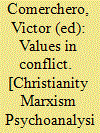

|
|
|
|
|
| Publication |
New York, Appleton Centure Crofts, 1970.
|
| Description |
xv, 909p.
|
|
|
|
|
|
|
|
|
|
|
|
Copies: C:1/I:0,R:0,Q:0
Circulation
| Accession# | Call# | Current Location | Status | Policy | Location |
| 004555 | 305/COM 004555 | Main | On Shelf | General | |
|
|
|
|
|
|
|
|
|